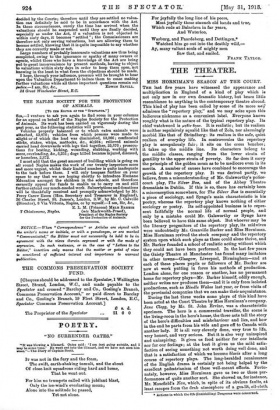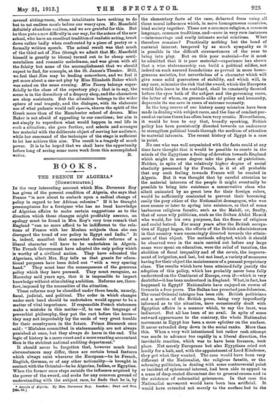THE THEATRE.
MISS HORNIMAN'S SEASON AT THE COURT. THE last five years have witnessed the appearance and multiplication in England of a kind of play which is not only new in our own dramatic history, but bears little resemblance to anything in the contemporary theatre abroad. This kind of play has been called by some of its more nth) admirers the "repertory play," and we may seize upon this ludicrous nickname as a convenient label. Everyone knows roughly what is the nature of the typical repertory play. Its chief watchword is an86, it-yay. It is realistic ; but its realism is neither repulsively squalid like that of Zola, nor alarmingly morbid like that of Strindberg : its realism is the safe, quiet realism of everyday life. In controversies the repertory play is scrupulously fair; it sits on the cross benches ; it takes up the middle line. Its characters belong to the middle classes, ranging from the lower strata of gentility to the upper strata of poverty. So far does it carry the principle of the golden mean as to be mediocre even in its merits. A number of causes have combined to encourage the growth of the repertory play. It was derived partly, we believe, from a misunderstanding of Mr. Galsworthy's police- court play, The Silver Box, and of the Abbey Theatre dramatists in Dublin. If this is so, there has certainly been a misconception somewhere, for The Silver Box is essentially a piece of sociology, and Synge's main characteristic is his poetry, whereas the repertory play knows nothing of either sociology or poetry. Its self-appointed business is to repre- sent faithfully the normal life of normal people, and only by a mistake could Mr. Galaworthy or Synge have been believed to have this same object. But whoever may be the literary progenitors of the repertory play, its midwives were undoubtedly Mr. Granville Barker and Miss Horniman. Miss Horniman revived the stock company and the repertory system upon which such plays as these could alone thrive, and Mr. Barker founded a school of realistic acting without which they could not have been performed. In the last few years the Gaiety Theatre at Manchester has found many imitators in other towns—Glasgow, Liverpool, Birmingham—and at each of these places pupils or followers of Mr. Barker are now at work putting in force his methods of production. London alone, for one reason or another, has no permanent home for repertory plays—Mr. Barker himself, oddly enough, neither writes nor produces them—and it is only from isolated productions, such as Hindle Wakes last year, or from visits of the provincial companies that we can make their acquaintance.
During the last three weeks some plays of this kind have been acted at the Court Theatre by Miss Horniman's company. Jane Clegg, by Mr. St. John Ervine, was a characteristic specimen. The hero is a commercial traveller, the scene is the living-room in the hero's house, the three acts tell the story of the hero's difficulties and misbehaviour and lies, and how in the end he parts from his wife and goes off to Canada with another lady. It is all very cleverly done, very true to life, very honest, and very serious. But it is also very uninspired and uninspiring. It gives us food neither for our intellects nor for our feelings ; at the beat it gives us the mild satis- faction of seeing something not worth doing well done, and that is a satisfaction of which we become biases after a long course of repertory plays. The long-heralded renaissance of the English drama is certainly not being helped by the excellent pedestrianism of these well-meant efforts. Fortu- nately, however, Miss Horniman gave us two or three per- formances of quite another sort. She showed us, for instance, Mr. Masefield's Nan, which, in spite of its obvious faults, at least escapes from the drab atmosphere of a gas-lit, oil-cloth
• Actions in which the 5th (Inniekilling) Dragoons were concerned.
overed sitting-room, whose inhabitants have nothing to do but to eat endless meals before our weary eyes. Mr. Masefield definitely abandons realism, and we are grateful for this. But he thus puts a new difficulty in our way, for the actors of the new school, who have an excellent tradition of realistic acting, break down rather badly when confronted by a piece of poetry or a formally written speech. The actual result was that much of the third act of Nan, (though we admit that Mr. Masefield himself is greatly to blame) turned out to be cheap senti- mentalism and romantic melodrama, and was given with all the falsity but none of the accomplishment that we should expect to find, for example, at the St. James's Theatre. Still, we feel that Nan may be leading somewhere, and we feel it yet more about a one-act play by Miss Elizabeth Baker which was acted on the same evening. Miss Tassey belongs super- ficially to the class of the repertory play ; that is to say, the scene is in the dormitory of a drapery shop, and the characters are shop assistants. But the situation belongs to the wider sphere of real tragedy, and the dialogue, with its elaborate use of what pedants would call Elpaeeta, shares the spirit of the Greek more than of the Manchester school of drama. Miss Baker is not afraid of appealing to our emotions; her aim is not simply to reproduce what would happen in real life in such a situation; she goes further, and selects and arranges her material with the deliberate object of moving her audience, while her command of the technique of the stage is sufficient to let her achieve this aim. The result is a tragedy of much power. It is to be hoped that we shall have the opportunity before long of seeing some more work from this accomplished



















































 Previous page
Previous page